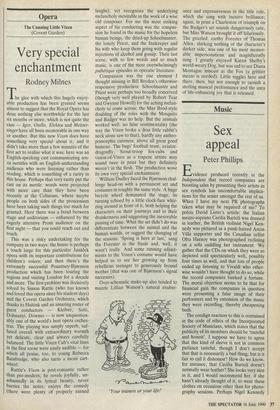Opera
Very special enchantment
Rodney MIInes The glee with which this hugely enjoy- able production has been greeted seems almost to suggest that the Royal Opera has done nothing else worthwhile for the last six months or more, which is not quite the case — Igor, Otello, Elektra and Meister- singer have all been memorable in one way or another. But this new Vixen does have something very special about it, and it didn't take more than a few minutes of the first act to realise what it was: here was an English-speaking cast communicating sen- za surtitles with an English-understanding audience who were listening rather than reading, which is something of a rarity in this house. Perhaps that very rarity put the cast on its mettle: words were projected with more care than they have been recently at the Coliseum, where maybe people on both sides of the proscenium have been taking such things too much for granted. Here there was a bond between stage and auditorium — enhanced by the eagerly attentive Prom audience on the first night — that you could reach out and touch.
This was a risky undertaking for the company in two ways: the house is perhaps a touch large for this particular JanRek Opera with its important contributions for children's voices; and then there's the extremely successful Pountney-Bjornson production which has been touring the regions and visiting London for a decade and more. The first problem was decisively solved by Simon Rattle (who has known and loved this opera since his student days) and the Covent Garden Orchestra, which thanks to Haitink and an amazing roster of guest conductors — Kleiber, Solti, Dohnanyi, Downes — is now unquestion- ably one of the world's best opera orches- tras. The playing was simply superb, suf- fused overall with extraordinary warmth yet delicate, clear and always carefully balanced. The little Vixen Cub's vital lines in the first scene were easily audible. — for which all praise, too, to young Rebecca Bainbridge, who also turns a mean cart- wheel.
Rattle's Vixen is post-romantic rather than pre-modern; he revels joyfully, un- ashamedly in its lyrical beauty, never hurries the notes, enjoys the comedy (there were plenty of properly earned
laughs), yet recognises the underlying melancholy inevitable in the work of a wise old composer. For me the most striking aspect of his conducting was the compas- sion he found in the music for the hopeless human beings, the dried-up Schoolmaster, the lonely Priest, and the Innkeeper and his wife who keep them going with regular injections of alcohol and gossip. Their last scene, with so few words and so much music, is one of the most overwhelmingly pathetique episodes in operatic literature.
Compassion was the one element I thought missing in Bill Bryden's otherwise responsive production: Schoolmaster and Priest were perhaps too broadly conceived (though very well played by Robert Tear and Gwynne Howell) for the aching melan- choly to come across; the Max Brod-style doubling of the roles with the Mosquito and Badger was no help. But the animals worked well: no false sentimentality (the way the Vixen broke a dear little rabbit's neck alone saw to that), hardly any anthro- pomorphic cuteness, above all great good humour. The bugs' football team, aviator- dragonfly, Scout-troop fox-cubs and vision-of-Vixen as a trapeze artiste may sound twee in print but they definitely weren't in the flesh. The production wove its own very spetial enchantment.
William Dudley faced the Bjornson chal- lenge head-on with a permanent set and costumes in roughly the same style. A huge bicycle wheel dominated the stage, its turning echoed by a little clock-face whiz- zing around in front of it, both helping the characters on their journeys and in their drunkenness and suggesting the inexorable passing of time. What the set didn't do was differentiate between the animal and the human worlds, or suggest the changing of the seasons: 'Spring is here at last,' sang the Forester in the finale and, well, it wasn't really. And some running adjust- ments to the Vixen's costume would have helped us to see her growing up from rebellious teenager to generously fecund mother (that was one of Bjornson's signal successes).
Over-schematic make-up also tended to muzzle Lillian Watson's natural eicuber- `Your trainers or your life!'
arice and expressiveness in the title role, which she sang with incisive brilliance; again, in print a Charleston of triumph on the Badger's set sounds dangerously cute, but Miss Watson brought it off hilariously. The grizzled, earthy Forester of Thomas Allen, shirking nothing of the character's darker side, was one of his most memor- able impersonations and magnificently sung. I greatly enjoyed Karen Shelby's world-weary Dog, but was sad to see Diana Montague miscast as the Fox (a grittier mezzo is needed). Little niggles here and there, then, but not enough to tarnish a sterling musical performance and the aura of life-enhancing joy that it released.


















































 Previous page
Previous page